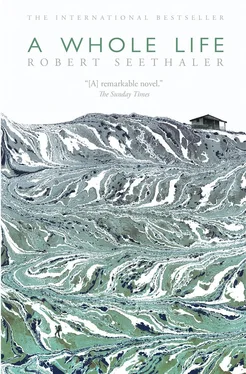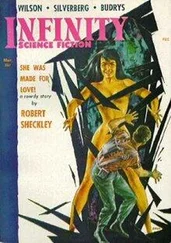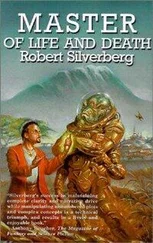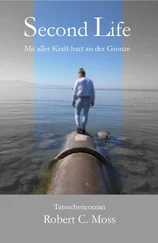Robert Seethaler - A Whole Life
Здесь есть возможность читать онлайн «Robert Seethaler - A Whole Life» весь текст электронной книги совершенно бесплатно (целиком полную версию без сокращений). В некоторых случаях можно слушать аудио, скачать через торрент в формате fb2 и присутствует краткое содержание. Год выпуска: 2015, Издательство: House of Anansi Press Inc, Жанр: Современная проза, на английском языке. Описание произведения, (предисловие) а так же отзывы посетителей доступны на портале библиотеки ЛибКат.
- Название:A Whole Life
- Автор:
- Издательство:House of Anansi Press Inc
- Жанр:
- Год:2015
- ISBN:нет данных
- Рейтинг книги:4 / 5. Голосов: 1
-
Избранное:Добавить в избранное
- Отзывы:
-
Ваша оценка:
- 80
- 1
- 2
- 3
- 4
- 5
A Whole Life: краткое содержание, описание и аннотация
Предлагаем к чтению аннотацию, описание, краткое содержание или предисловие (зависит от того, что написал сам автор книги «A Whole Life»). Если вы не нашли необходимую информацию о книге — напишите в комментариях, мы постараемся отыскать её.
Set in the mid-twentieth century and told with beauty and tenderness, his story is one of man's relationship with an ancient landscape, of the value of solitude, the arrival of the modern world, and above all, of the moments, great and small, that make us who we are.
A Whole Life — читать онлайн бесплатно полную книгу (весь текст) целиком
Ниже представлен текст книги, разбитый по страницам. Система сохранения места последней прочитанной страницы, позволяет с удобством читать онлайн бесплатно книгу «A Whole Life», без необходимости каждый раз заново искать на чём Вы остановились. Поставьте закладку, и сможете в любой момент перейти на страницу, на которой закончили чтение.
Интервал:
Закладка:
‘You limp,’ he said. ‘We can’t use someone like you.’
‘There’s no better worker around here than me,’ Egger answered. ‘I’m strong. I can do anything. I’ll do anything.’
‘But you limp.’
‘In the valley, maybe,’ said Egger. ‘On the mountain I’m the only one who walks upright.’
The general manager slowly leaned back. Silence filled the room, settling like a dark veil over Egger’s heart. He stared at the whitewashed wall and for a moment he could no longer remember why he had come here at all. The manager sighed. He raised his hand and made a gesture as if trying to erase Egger from his field of vision. Then he said, ‘Welcome to Bittermann & Sons. No alcohol, no whoring, no unions. Start tomorrow morning, half-past five!’
—
Egger helped to cut timber and erect the massive iron girders that threaded their way at fifty-metre intervals along a dead straight line, further and further up the mountain. Each one towered several metres over the congregational chapel, the highest building in the village. He carried iron, wood and cement up the hillside and back down again. He dug foundation trenches in the forest floor and drilled holes in the rock as big as an arm for the chief blaster to lay his sticks of dynamite. During the blasting he squatted at a safe distance with the others on the tree trunks that lay to the left and right of the wide forest aisle. They covered their ears and felt the detonations, which made the mountain tremble beneath their backsides. Because he knew the area like practically no one else, and also had an excellent head for heights, he was usually sent on ahead and was first to arrive at the drill site. He scrambled over scree, climbed between rocks, and hung on the steep mountain face secured only by a thin rope, his gaze fixed on the small cloud of dust his drill raised in front of his face. Egger liked working on the rock. The air up here was cool and clear, and sometimes he heard the scream of a golden eagle, or saw its shadow glide noiselessly across the rock. He often thought of Marie. Of her warm, rough hand, and her scar, the curve of which he traced over and over again in his mind’s eye.
In the autumn Egger was overcome with restlessness. He believed the time had finally come for him to ask Marie for her hand, but he still had no idea how to go about it. He sat on his doorstep in the evenings and surrendered himself to hazy ideas and dreams. Of course, he thought, his proposal could not just be any old proposal. It had to be one that somehow epitomized the magnitude of his love and would engrave itself for ever on Marie’s memory and heart. Something in writing, he thought; but he wrote even more seldom than he spoke, which meant almost never. On top of which, in his opinion, a letter wasn’t really up to the task. How were all his thoughts and feelings in their profusion supposed to fit onto a single sheet of paper? Ideally he would have liked to inscribe his love on the mountain, in huge letters, visible for miles around to everyone in the valley. He explained his problem to his colleague Thomas Mattl, who was pulling recalcitrant rootstocks out of the earth with him at the edge of the forest aisle. Mattl was an experienced lumberjack and one of the company’s longest-serving employees. For almost thirty years he had been travelling with different teams throughout the mountain regions, clearing the forests in the name of progress and planting iron girders or concrete pillars into the ground. Despite his age, and the pains that he said had sunk their teeth into his lower back like a pack of rabid dogs, he was light on his feet and moved nimbly through the undergrowth. Perhaps there really was a way of inscribing something on the mountain, said Mattl, running his hand over his bearded face: with the devil’s ink, which was to say, with fire. In his youth he had spent a couple of summers chopping wood for bridges in the north. There he had encountered the ancient tradition of the Sacred Heart Fires, huge fire pictures that were lit on the summer solstice, illuminating the mountain by night. If you could draw with fire, he said, you could write with it, too. Some kind of proposal for this Marie, for example. Three, four words, no more than that, of course, you couldn’t do more than that. Will you have me? or Come, sweetheart ; whatever it is women like to hear.
‘That could work,’ Mattl added thoughtfully. Then he reached behind his head and pulled out a slender, budding twig that had caught in his collar. He bit off the little white buds one by one and sucked them like sweets.
‘Yes,’ Egger nodded. ‘That could work.’
Two weeks later, in the late afternoon of the first Sunday in October, seventeen of the most reliable men in Egger’s team were clambering around in the scree above the Adlerkante. They were laying out, according to Mattl’s hoarsely barked instructions, two hundred and fifty little cloth bags, filled with sawdust and soaked in paraffin, each weighing one and a half kilograms, at approximately two-metre intervals along a line marked out with hemp ropes. A few days earlier Egger had gathered the men in the canteen tent after work to explain his plans and persuade them to play a part. ‘You’ll get seventy groschen and a quarter-litre of Krauterer,’ he said, looking into the men’s dirty faces one by one. Over the preceding weeks he had saved the money from his wages, collecting the coins in a little candle-box which he had deposited in a hole in the ground beneath his threshold.
‘We want eighty groschen and half a litre!’ said a black-haired engine fitter, who had joined the firm from Lombardy just a couple of weeks earlier and, thanks to his pressure-cooker temperament, had quickly acquired a certain authority within the team.
‘Ninety groschen and no Krauterer,’ countered Egger.
‘There has to be Krauterer.’
‘Sixty groschen and half a litre.’
‘Done!’ shouted the black-haired man, and banged his fist on the table to confirm the deal.
Thomas Mattl spent most of the time sitting on a spur of rock, keeping an eye on what the men were doing. Under no circumstances should the bags be more than two metres apart, otherwise there would be gaps in the writing. ‘We can’t let love perish because of a gap in a letter, you fool,’ he shouted, flinging a fist-sized stone in the direction of a young scaffolder whose spaces had come out slightly too big.
All the bags were laid out just in time for sunset. Night was settling over the mountains and Mattl crawled down from his rock towards the first bag of the first letter. He surveyed the hillside and the men spread out evenly across it. Then he slapped the dust off his trousers, fished a box of matches out of his trouser pocket and ignited a stick wrapped in paraffin-soaked rags that was planted in the ground in front of him. He took the torch, brandished it above his head, and gave the clearest, loudest whoop he had ever come out with in his life. Almost simultaneously sixteen torches flared across the scree and the men began to run along the lines as fast as they could, igniting the bags one after another. Mattl chuckled quietly. He thought with pleasure of the schnapps that awaited him, while at the back of his neck he sensed the cool breath of the night as it descended ever deeper over the mountains.
At this precise moment, down in the valley, Andreas Egger was putting his arm around Marie’s shoulders. They had arranged to meet at sunset on the tree stump beside the old footbridge, and to Egger’s relief she had arrived on time. She was wearing a pale linen dress and her hair smelled of soap, hay, and also, Egger thought, a little of roast pork. He spread his jacket over the tree stump and indicated for her to sit. He wanted to show her something, he said, something she might never forget. ‘Something nice?’ asked Marie. ‘Could be,’ he said. They sat beside each other and watched in silence as the sun disappeared behind the mountains. Egger heard his own heart pounding. For a moment it seemed to him to be beating not within his breast but in the tree stump beneath him, as if the mouldy wood had awakened to new life. Then they heard Thomas Mattl’s whoop far away in the distance, and Egger pointed out into the darkness. ‘Look,’ he said. A second later sixteen lights flickered high up on the opposite side of the valley, moving in every direction like a swarm of fireflies. As they moved, the lights seemed to lose glowing drops which joined up, one by one, to form curving lines. Egger felt Marie’s body next to his. He put his arm around her shoulders and heard her quiet breathing. On the other side of the valley the glowing lines swooped across the hillside in arc after arc, or closed in rounded shapes. Right at the end a single dot lit up above the I on the top right, and Egger knew that old Mattl himself had clambered across the scree to ignite the last bag of paraffin. FOR YOU, MARIE stood inscribed on the mountain in huge, flickering letters, visible for miles around to everyone in the valley. The ‘M’ was rather crooked, and there was a piece missing, too, so that it looked as if someone had pulled it apart in the middle. At least two of the bags had apparently failed to catch fire, or hadn’t been set at all. Egger took a deep breath: then he turned to Marie and tried to make out her face in the darkness.
Читать дальшеИнтервал:
Закладка:
Похожие книги на «A Whole Life»
Представляем Вашему вниманию похожие книги на «A Whole Life» списком для выбора. Мы отобрали схожую по названию и смыслу литературу в надежде предоставить читателям больше вариантов отыскать новые, интересные, ещё непрочитанные произведения.
Обсуждение, отзывы о книге «A Whole Life» и просто собственные мнения читателей. Оставьте ваши комментарии, напишите, что Вы думаете о произведении, его смысле или главных героях. Укажите что конкретно понравилось, а что нет, и почему Вы так считаете.











